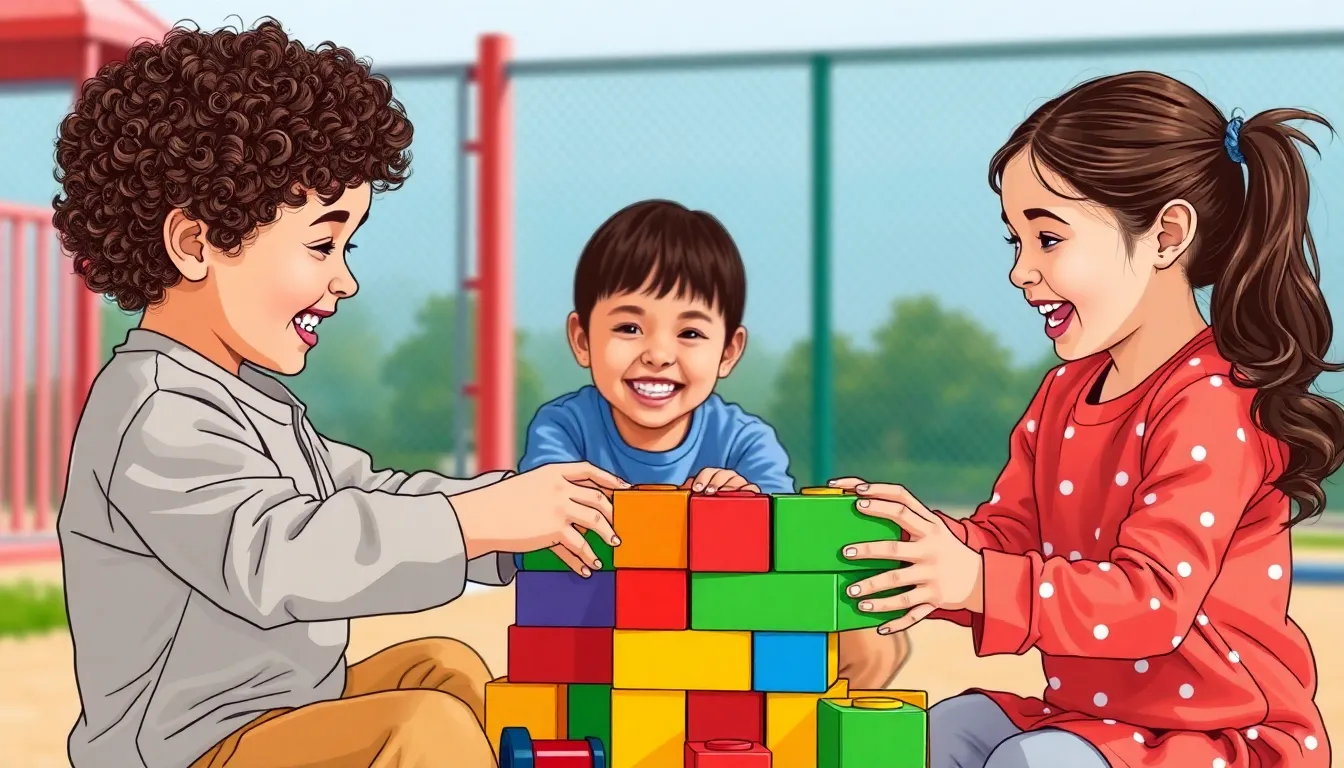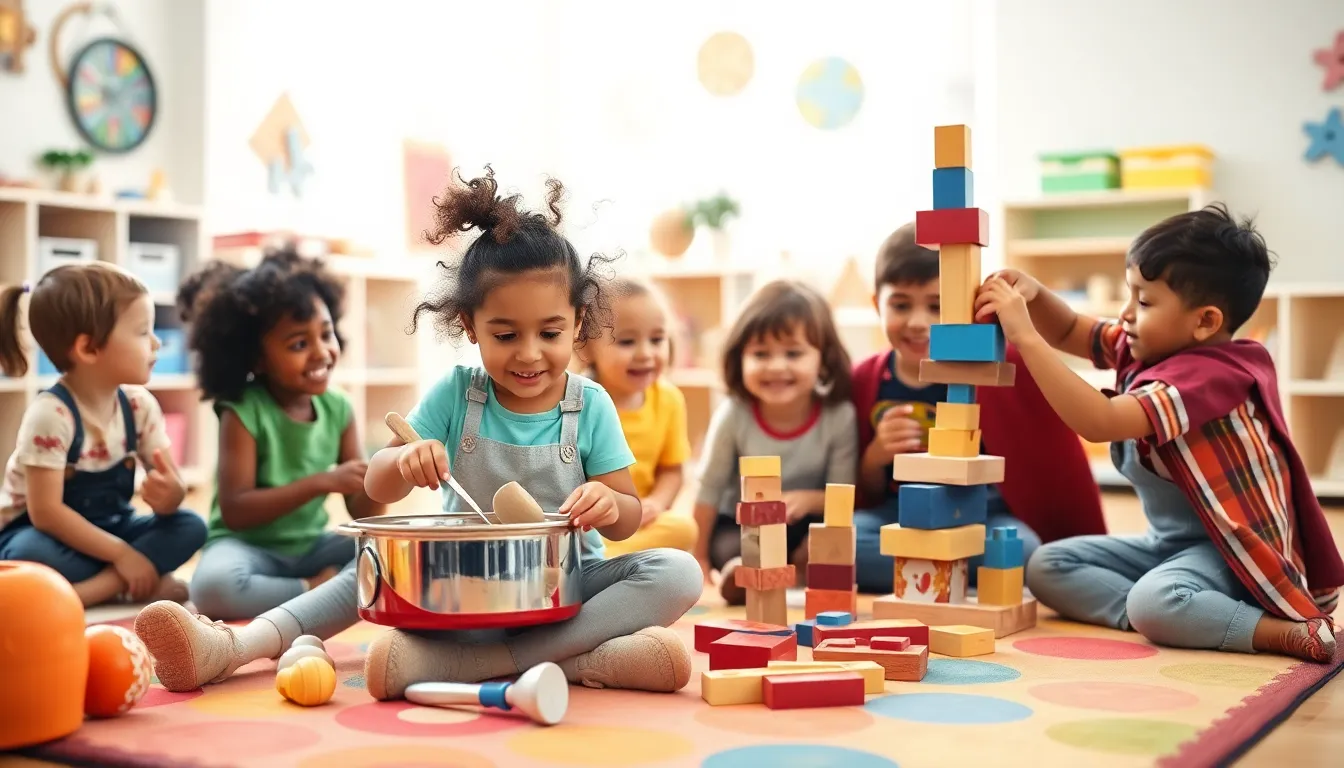Table of Contents
ToggleWhen it comes to kids and language, play isn’t just fun; it’s a secret weapon! Imagine a world where building blocks and make-believe games pave the way for vocabulary explosions. That’s right—while kids are busy pretending to be superheroes or baking imaginary cakes, they’re actually mastering the art of communication. Who knew that a simple game of “let’s pretend” could unlock the door to language growth?
Understanding Language Growth Through Play
Language development significantly benefits from play. Engaging in various playful activities encourages children to enhance their vocabulary and communication skills.
The Concept of Language Growth
Language growth encompasses vocabulary acquisition and the development of grammar and pronunciation. Children learn to express ideas, emotions, and needs through interaction. They absorb new words while playing, connecting concepts and contexts. Active listening during conversations further shapes their understanding. Active participation in discussions reinforces their ability to communicate effectively. Research shows that children exposed to rich language environments during play demonstrate better language skills overall.
The Role of Play in Development
Play serves as a natural medium for learning. It promotes social interactions, allowing children to practice language in context. Group activities and role-playing foster cooperative communication. Imaginative play stimulates creativity, supporting problem-solving skills. Children mimic adults, learning language usage and conversational turns. Structured play, like games or storytelling, offers opportunities for language practice. Frequent engagement in such activities leads to improved expressive language abilities. The integration of play into daily routines enriches children’s language development experiences.
Types of Play That Foster Language Growth

Different types of play significantly contribute to children’s language development. Engaging in various play activities enhances vocabulary, communication skills, and overall language abilities.
Symbolic Play
Symbolic play involves using objects to represent something else, like pretending a banana is a phone. During this type of play, children actively practice language. They create narratives, develop scenarios, and use dialogue, enhancing their vocabulary in context. Partners in pretend play often fuel creativity, encouraging children to express thoughts and feelings. The complexity of their language increases as they navigate different roles, such as parents or doctors. Encouraging symbolic play offers children opportunities to explore social dynamics and refine their language skills.
Social Play
Social play focuses on interactions with peers, crucial for language growth. Children participate in games that require exchanging ideas, negotiating roles, and cooperating to achieve common goals. Through conversations during play, they practice turn-taking, listening, and responding appropriately. Engaging with others in social play helps children learn new words and phrases, often inspired by peers. Challenging children to collaborate fosters teamwork and communication, while also enriching their vocabulary in real-time situations. Social play creates a vibrant environment where language skills flourish through meaningful interactions.
Benefits of Language Growth Through Play
Language growth through play offers numerous advantages for children’s overall development. Engaging in playful activities enhances language skills while supporting cognitive and social development.
Cognitive Development
Cognitive development flourishes through play. Children encounter various scenarios that require critical thinking and problem-solving skills. Engaging in role-play allows them to experiment with language and create narratives, enhancing vocabulary and comprehension. Creating stories during symbolic play strengthens narrative skills and encourages creativity. Children also recognize cause-and-effect relationships as they navigate different play environments. Such interactions advance their ability to structure sentences and articulate thoughts clearly. Lastly, participating in group activities cultivates active listening, which is vital for understanding and processing language.
Social Skills Enhancement
Social skills enhancement occurs naturally during play. Interaction with peers facilitates language practice within a social context. Negotiating roles and exchanging ideas fosters effective communication and cooperation. Children learn to take turns, which promotes patience and respect during conversations. Engaging in cooperative games encourages teamwork, teaching children to express their needs and ideas openly. Joint storytelling or collaborative projects further enrich their vocabulary and communicative competence. Social play situates language within relationships, allowing children to develop empathy and understand diverse perspectives. These skills contribute to overall emotional intelligence, essential for successful interactions throughout life.
Strategies for Parents and Educators
Parents and educators can implement effective strategies that foster language growth through play. These methods enhance children’s vocabulary and communication skills while enriching their overall developmental experiences.
Creating a Language-Rich Environment
Establishing a language-rich environment significantly supports language development. Use everyday conversations to incorporate new words into discussions. Include books in play areas, allowing children to explore vocabulary through stories. Label common objects around the home or classroom to facilitate association between words and their meanings. Encourage storytelling during playtime, prompting children to narrate scenarios using their imagination. Provide various materials like puppets and dress-up clothes, stimulating narrative skills and creative expression. Encourage discussions around play items to foster communication and critical thinking.
Engaging in Interactive Play
Engaging in interactive play offers unique opportunities for developing language skills. Incorporate games that require turn-taking and dialogue, enabling children to practice conversation. Encourage role-playing activities where children assume different characters, enhancing their vocabulary and comprehension. Utilize board games that include discussions among players, promoting social interaction and cooperative communication. Be active in joining children’s play, responding to their ideas and questions to model effective language use. Foster opportunities for peer interaction, enabling children to negotiate roles and exchange thoughts, enriching their language experiences in real-time situations.
Language growth through play is a vital aspect of children’s development. Engaging in playful activities not only enhances vocabulary but also nurtures communication skills. Children learn to express themselves and interact with others in meaningful ways. By fostering an environment rich in language opportunities, parents and educators can significantly impact a child’s ability to communicate effectively.
Play encourages creativity and critical thinking while providing a platform for social interactions. As children navigate different play scenarios, they refine their language abilities and develop essential social skills. Ultimately, integrating play into learning experiences lays a strong foundation for lifelong language development and overall growth.




